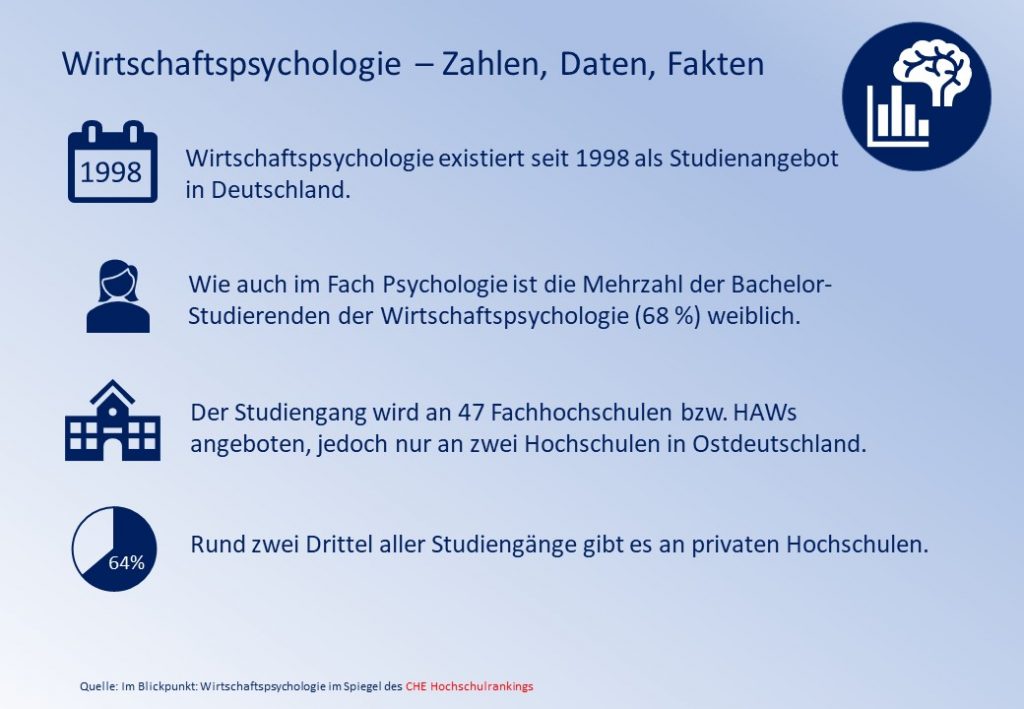
Business Psychology is highly popular among would-be students as an alternative to a traditional psychology degree. The large majority of programmes offered by the comparatively few state-controlled universities are subject to restricted admission. But numerous private higher education institutions (HEIs) offer the subject, usually with no restrictions on the number of places available. There are also significant regional differences in the distribution of the programme, as revealed by a current evaluation by the CHE Centre for Higher Education.
Business Psychology was only introduced as a degree programme at German HEIs in 1998, making it a relatively young discipline. The subject is an interesting alternative for prospective students who have been unable to gain a place on a university psychology programme, owing to nationwide admission restrictions. But not only that – the subject also appeals to would-be students who are interested in studying psychology and keen to undertake practice-based training and specifically qualify for a job in industry. Opportunities for graduates can be found in areas such as human resources development.
“Business Psychology is a typical example of how the range of courses on offer in Germany has developed,” explained Cort-Denis Hachmeister. “It is a highly sought-after subject that combines two traditional subject areas in an interdisciplinary way to create something new, also touching on topics from the healthcare sector such as stress or workload management,” remarked the author of the study.
In May 2020, the discipline was included in the canon of 40 subjects in Germany that are considered in the CHE University Ranking. For this reason, CHE has compiled the key ranking results and other data concerning Business Psychology in a publication.
The subject of Business Psychology is currently offered at universities of applied sciences in a total of 47 university towns. Degree programmes such as Communication Psychology or Advertising Psychology, which are closely related to Business Psychology, were also included in the study.
The CHE evaluation shows that a high proportion of degree programmes offered in this subject are delivered by private HEIs (63.8 per cent). Most of the programmes take place at major university cities in Western Germany. Apart from the options available in Berlin, only two of the 47 degree programmes are based in federal states in Eastern Germany.
As is also the case in the subject of Psychology, the majority of the 10,000 people studying Business Psychology are women. On average, a good two thirds of students at the Bachelor level are women, increasing to 80 per cent at the Master’s level. The Master’s programme in Business Psychology at the Hochschule für Technik Stuttgart has the highest proportion of women (88 per cent).

The results of the survey of departments and students in the context of the CHE University Ranking revealed a particularly high level of contact with professional practice, whilst exhibiting a rather average degree of international orientation.
From the professors’ point of view, the most important requirements for studying Business Psychology are analytical thinking, an interest in research and academic writing, and communication skills. Each of these three skills were named by more than 60 per cent of the respondents.
At private HEIs, where tuition fees are charged, there are usually no restrictions on the number of students that can be accepted to these degree programmes. In other words, applicants do not compete with each other for a limited number of places. The situation is different at state-run universities, which do not charge fees.
The CHE survey showed that places at state-controlled universities are fully taken, which is why admissions restrictions are in place. “If you consider that there has been a high demand for university psychology programmes for years – and see that the programmes in Business Psychology delivered by state-run universities are full – it is quite surprising that the subject is offered at only 17 of the 100 or so state universities of applied sciences. Private providers have obviously been quicker to respond to this demand,” summarised CHE Executive Director Frank Ziegele. “On the whole, however, the subject is a good example of the higher education system’s ability to adapt. Universities of applied sciences manage to create new combinations of academic subjects in practice-based degree programmes.”
About the publication:
In the context of the CHE University Ranking, all of the 47 universities of applied sciences that offer degree programmes in Business Psychology in Germany were surveyed. Departments from 37 HEIs participated in the survey. A total of three different surveys took place: a survey of professors, a survey of departments, and a survey of students on Bachelor programmes. The entire data was collected using online questionnaires between the period of September 2019 and January 2020. The publication “Im Blickpunkt: Wirtschaftspsychologie im Spiegel des CHE Hochschulrankings” (Focus on Business Psychology as mirrored in the CHE University Ranking) was written by Cort-Denis Hachmeister.
